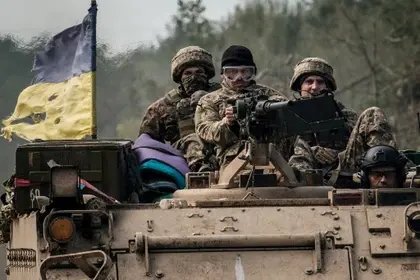Charred, rusting skeletons are all that remain of three Russian rocket launchers that were left destroyed near the frontline in southern Ukraine, where Kyiv’s forces have been pushing back Moscow’s invading troops.
Uplifted by their recent successes in recapturing territory in the Kherson region, Ukrainian soldiers now hope that by winter they will reach the regional capital of the same name, a key city that had fallen into Russian hands shortly after the invasion began on February 24.
JOIN US ON TELEGRAM
Follow our coverage of the war on the @Kyivpost_official.
Nearly a week after the Soviet-designed BM-27 Uragan multiple rocket launchers were struck by Ukraine, the smell of smoke still lingers at the site.
Inside the barrels of one of the giant eight-wheeled machines, several rockets remain intact. “They were reloading when we hit them,” a Ukrainian soldier explained to AFP.
One of the missile launcher’s trunks still holds a few tins of “Baltic fish”. On the floor next to the machine lies a frying pan that miraculously escaped the flames. A short distance away, a truck is also left abandoned, its Russian registration plate lying on the grass nearby.
But its precious cargo is still in good shape: a dozen heavy Uragan rockets that Ukraine’s army needs. “They will soon be loaded and transported to us,” the soldier added.
Another trophy snatched from the Russians, gunpowder barrels, have already been delivered to nearby Ukrainian troops. Other empty barrels are scattered on the ground.

N. Korean Troops Massed in Russia to Enter Ukraine War ’Soon’: Pentagon Chief
‘Low’ morale among Russians
“The Russians say they organised their withdrawal. But when someone organises their departure, they don’t leave weapons, underpants or pillows,” said a rescue services worker, who introduced himself as “Doc”.
Another soldier says morale among Russian troops is “low”. “The second army in the world is afraid of the 22nd,” he said, using his nom de guerre “Kappa”, meaning mouthguard.
“We should increase our speed even more rather than reduce it, push them across the river,” said Kappa, referring to the Dnipro river.
In recent weeks, Ukraine’s army has made advances to the west of the Dnipro river, while Russians remain firmly in control of the opposite bank.
But Moscow’s troops regrouped behind a new defensive line, strongly reinforced and even cemented in parts. Many Russian soldiers were also brought in as reinforcements.
Russians lost territory in northern Kherson in early September, when their troop numbers were low in this area with only a few villages, said George Barros of the Institute for the Study of War.
But now Russian lines are becoming “tighter”, facilitating their defences and complicating Ukraine’s advance, Barros added.
Placing a sixth or more of Russia’s total forces, who are “among the best”, in southwestern Kherson will be “extremely dangerous” for Kyiv, according to French military expert Michel Goya.
Potential ‘disaster
“The position is paradoxically solid but fragile, because it can explode under pressure,” which he said would constitute a “disaster perhaps decisive for the fate of the Russian expeditionary force in Ukraine”.
A spokeswoman for Ukraine’s southern army command, Natalia Gumeniuk, said Ukraine’s chances are bolstered by Moscow’s soldiers “looking for ways to announce their desire to surrender” and that Russian logistics routes have been “significantly damaged”.
For months, Kyiv’s forces have been striking Russian warehouses with ammunition and infrastructure that allows them to supply their troops, such as bridges.
The Crimea bridge, which according to Gumeniuk provided 75 percent of military supplies to the Kherson region, was hit by a large explosion over the weekend, which Moscow blamed on Kyiv.
Ukraine has not claimed responsibility for the attack.
But “the Russians don’t have any supply problems yet,” said French expert Pierre Grasser.
If the situation were “critical” they would carry out “many more airborne deliveries”, he explained.
For Ukraine, Kherson — a city with strategic and symbolic importance — is the long-term goal, he added, but it may not be achievable before winter or even during winter, he said.
It remains to be seen what will become of Kherson next. Taking the city by force would mean casualties on both sides, and severe destruction.
Grasser suggests a possible “barter” between Kyiv and Moscow, with Ukraine abandoning its claims on the eastern Donbas region in exchange for Kherson returned in “good condition”.
But for Barros, the only possible outcome is a full Ukrainian victory.
“The Russians lost the war back in March and we’ve been seeing the prolonged version of that now,” he said.
You can also highlight the text and press Ctrl + Enter






